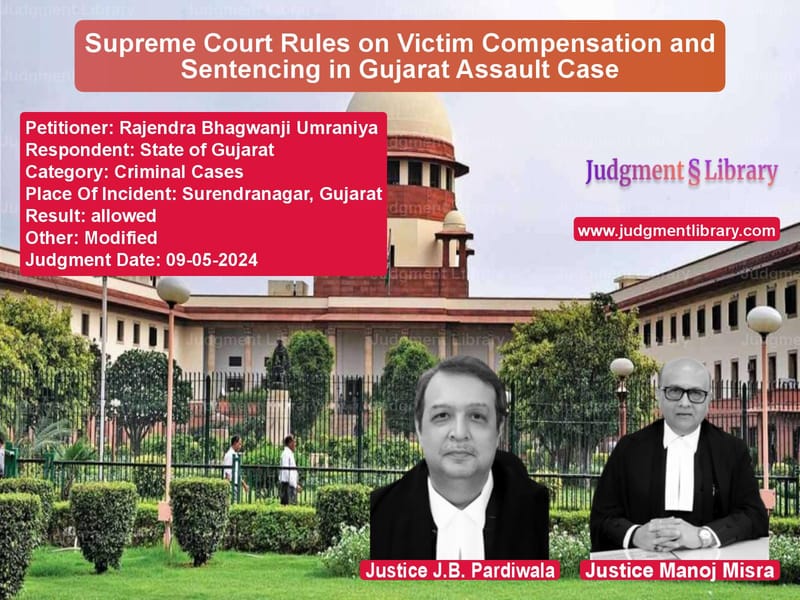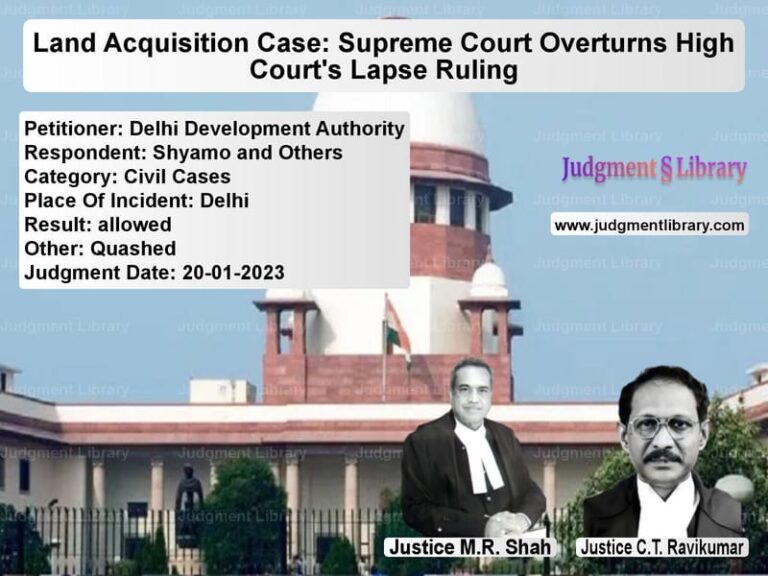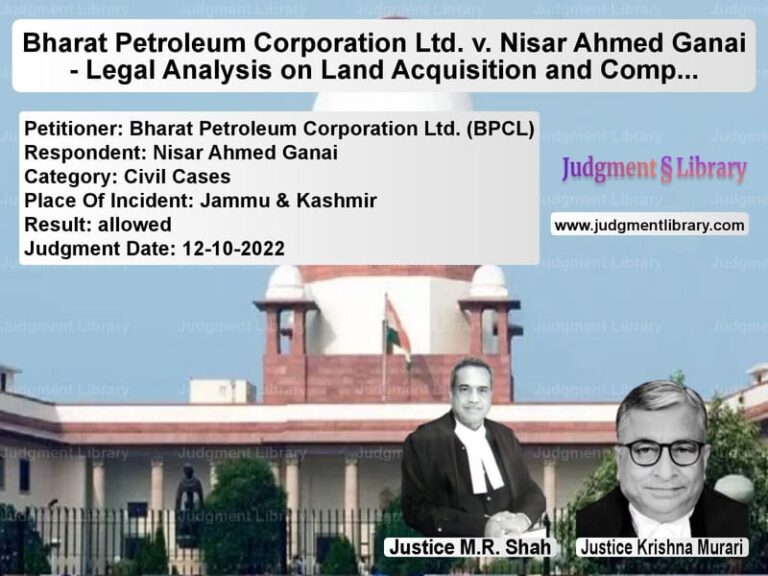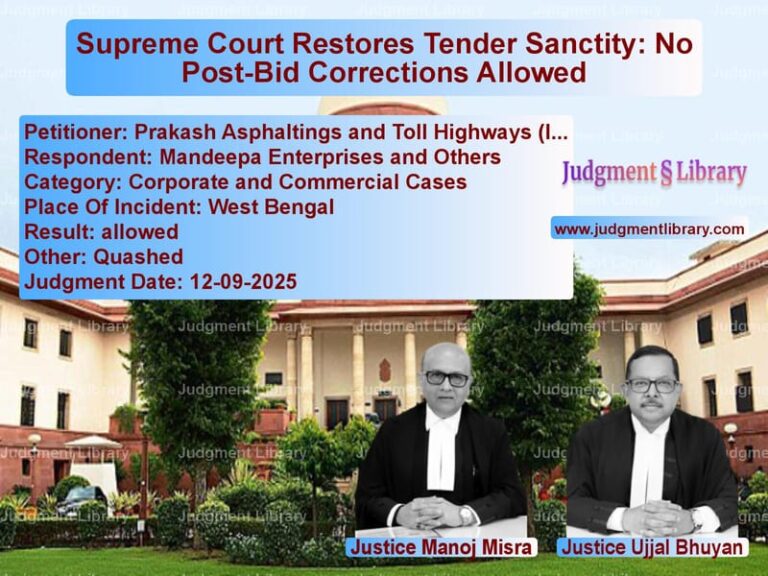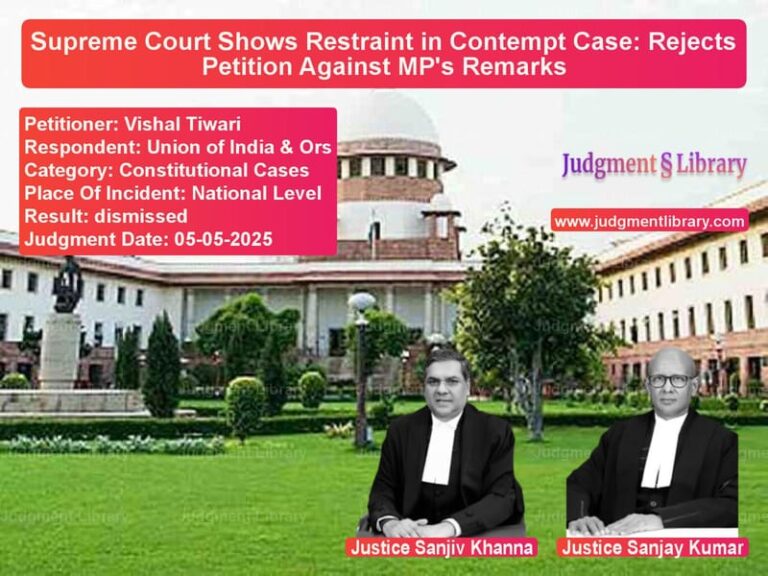Supreme Court Rules on Victim Compensation and Sentencing in Gujarat Assault Case
The Supreme Court of India has delivered a critical judgment in the case of Rajendra Bhagwanji Umraniya vs. State of Gujarat, addressing the legality of modifying sentences based on compensation payments. The case revolves around an assault incident in Gujarat, where the High Court had reduced the sentence of the accused in exchange for victim compensation. The Supreme Court ruled that such a reduction was impermissible, reinforcing the principle that victim compensation should not be a factor in determining sentencing.
Background of the Case
The dispute arose from a violent altercation in Surendranagar, Gujarat, leading to criminal charges against multiple individuals. The original complainant, Rajendra Bhagwanji Umraniya, filed an FIR in 2012 alleging assault and extortion. The Sessions Court convicted the accused under Sections 325, 323, and 135 of the Gujarat Police Act, sentencing them to rigorous imprisonment.
Chronology of Events
- 2012: FIR No. I-179/2012 filed at Surendranagar City Police Station against five accused persons.
- 2014: The Sessions Court convicted two accused and sentenced them to five years’ rigorous imprisonment.
- 2015: The Gujarat High Court reduced the sentence to four years and further ruled that if the accused paid Rs. 2.5 lakh each to the victim, they would not need to serve the remaining sentence.
- 2016: The original complainant challenged the Gujarat High Court’s ruling before the Supreme Court.
- 2024: The Supreme Court ruled that compensation cannot be a substitute for a criminal sentence.
Legal Issues Considered
The Supreme Court addressed several critical questions:
- Can victim compensation be linked to a reduction in criminal sentencing?
- Is the High Court’s ruling consistent with Section 357 of the Code of Criminal Procedure (CrPC)?
- Does reducing a sentence in exchange for compensation violate the principles of justice?
Arguments by the Appellant (Rajendra Bhagwanji Umraniya)
The complainant, represented by Senior Advocate Harin P. Raval, argued:
- The High Court’s decision to reduce the sentence upon payment of compensation was legally flawed.
- Compensation under Section 357 of the CrPC is meant to provide relief to victims but should not be a factor in sentencing.
- The accused should serve the full sentence of four years as determined by the High Court.
Arguments by the Respondent (Convicted Accused)
The convicted individuals, represented by Advocate Purvish Malkan, contended:
- The Gujarat High Court had correctly exercised its discretion by balancing retributive justice with compensatory relief.
- The accused had already deposited the Rs. 5 lakh compensation ordered by the High Court.
- The incident had occurred over a decade ago, and further imprisonment would serve no additional purpose.
Supreme Court’s Judgment
The Supreme Court ruled in favor of the appellant, striking down the Gujarat High Court’s order that reduced the sentence based on compensation payments. The key observations included:
“Payment of victim compensation cannot be a consideration or a ground for reducing the sentence imposed upon the accused. Compensation is restitutory in nature and has no bearing on the punitive sentence.”
- The Court found that sentencing should be independent of victim compensation.
- Victim compensation under Section 357 of the CrPC is meant to assist victims but should not influence the duration of punishment.
- Allowing offenders to buy their way out of sentences would undermine the criminal justice system.
Impact of the Judgment
The ruling has significant implications for the administration of criminal justice:
- Reaffirmation of Sentencing Principles: Courts cannot allow monetary compensation to substitute for imprisonment.
- Strengthened Victim Rights: Compensation remains independent of sentencing decisions.
- Judicial Consistency: The ruling ensures uniformity in the application of criminal penalties across cases.
Conclusion
The Supreme Court’s decision in Rajendra Bhagwanji Umraniya vs. State of Gujarat clarifies the role of victim compensation in the justice system. By ruling that compensation cannot be a basis for reducing criminal sentences, the Court reinforces the fundamental principles of law and justice. The judgment ensures that punishment serves its intended purpose and upholds the integrity of the criminal justice system.
Petitioner Name: Rajendra Bhagwanji Umraniya.Respondent Name: State of Gujarat.Judgment By: Justice J.B. Pardiwala, Justice Manoj Misra.Place Of Incident: Surendranagar, Gujarat.Judgment Date: 09-05-2024.
Don’t miss out on the full details! Download the complete judgment in PDF format below and gain valuable insights instantly!
Download Judgment: rajendra-bhagwanji-u-vs-state-of-gujarat-supreme-court-of-india-judgment-dated-09-05-2024.pdf
Directly Download Judgment: Directly download this Judgment
See all petitions in Attempt to Murder Cases
See all petitions in Extortion and Blackmail
See all petitions in Judgment by J.B. Pardiwala
See all petitions in Judgment by Manoj Misra
See all petitions in allowed
See all petitions in Modified
See all petitions in supreme court of India judgments May 2024
See all petitions in 2024 judgments
See all posts in Criminal Cases Category
See all allowed petitions in Criminal Cases Category
See all Dismissed petitions in Criminal Cases Category
See all partially allowed petitions in Criminal Cases Category

